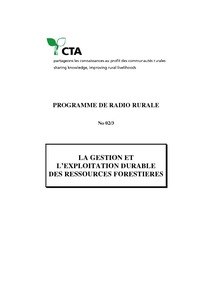Forest ecosystem services: can they pay our way out of deforestation?
This paper first provides a brief overview of what are and what represent forest ecosystem services. Then it considers the issues of price and valuation, and shows that valuation itself is not a solution but merely a tool. Considering then the reasons of the overall degradation of forest ecosystem services it shows that the main reasons tend to be fundamental: deforestation most often happens because it pays for local people - not so much because the institutionally created arrangements are perverse.


